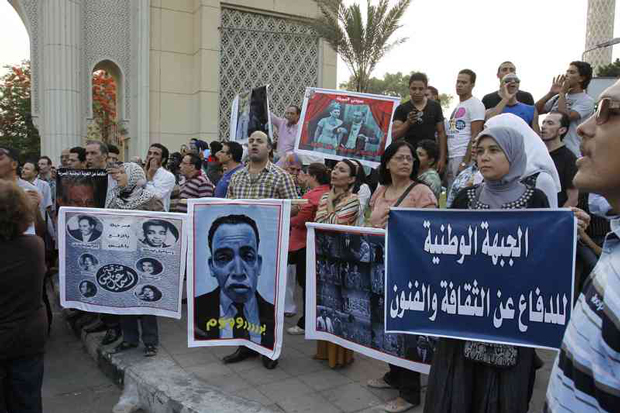28 Jun 2013 | Middle East and North Africa

Egyptian intellectuals hold posters and the Tamarod (Rebellion) petitions while chanting slogans during a demonstration against the Minister of Culture Alaa Abdel Aziz, in front of the opera house in Cairo. (Photo: Mohamed Elmaymony / Demotix)
Tensions have been building up in Egypt ahead of mass protests called for by opposition activists on 30 June, the date marking the first anniversary of Islamist President Mohamed Morsi’s inauguration. Shahira Amin reports on the growing concerns for free expression
A sit in by a group of Egyptian filmmakers, writers, performers and intellectuals — which has continued for the past two weeks outside Cairo’s Ministry of Culture — is seen as a prelude to the bigger anti-Muslim Brotherhood protests planned for Sunday. The mass demonstrations are being called for by “Tamarod” (Rebellious), a nationwide campaign launched by members of the opposition Kefaya to collect signatures from Egyptians for a vote of no confidence in the Islamist President. Organizers of the campaign recently announced that they have succeeded in gathering 15 million signatures.
Meanwhile, the arts protesters outside the ministry are demanding the removal of Egypt’s new Islamist minister of culture Alaa Abdel Aziz and protesting what they claim are efforts by the Islamist government to “Ikhwanize” the arts. Ikhwanize is an Arabic word which literally means the appointment of members of the Muslim Brotherhood in key positions in state institutions.
The protesters have been using peaceful means to hammer home their message including poetry recitals, performances and raising placards with anti-Muslim Brotherhood slogans.
Skirmishes broke out briefly last week after the peaceful rally was attacked by Islamist supporters of President Morsi who chanted pro-Muslim Brotherhood slogans and demanded that the minister purge the ministry of old regime remnants. Several protesters were injured in rock throwing incidents and assaults by the Islamist demonstrators before riot police intervened.
The protesters began their sit in after Abdel Aziz dismissed several cultural figures including the directors of the General Egyptian Book Organization, the Cairo Opera House and the National Library and Archives. These firings fueled fears that the expulsions were a first step to stifling artistic expression in the country by placing conservative Islamists at the helm of these institutions.
In a press statement released earlier this month, the Abdel Aziz defended the dismissals as a “campaign against corruption” which he said was a necessary step to purge the ministry of corrupt elements and halt embezzlement of public funds by greedy individuals. The cast of Opera Aida retaliated by appearing on stage with anti-Muslim Bortherhood placards and chants calling for the downfall of the Morsi regime.
Today on Index
Lords criticise Stormont delay on libel reform | Turkey must end attempts to limit free speech | Free speech roundup: Bahrain edition | Free expression in the news
The sackings followed controversial statements made earlier this month by conservative Salafist MP Gamal Hamed who criticized ballet as the “art of nudity” during a televised parliamentary session. His statements sparked concerns that ballet performances may be banned under the Islamist government. In recent months, some ultra-conservative Salafis have condemned the display of statues, insisting that depiction of the human body in paintings or sculpture is “frowned upon in Islam.” Such statements have stirred controversy, triggering an outcry by Egyptian liberals and intellectuals who are growing increasingly concerned that the rising wave of conservatism sweeping the country threatens the thousands of statues in museums and historic temples.
“Such statements pose a very real threat tp our ancient heritage as they may incite violent attacks by Islamist zealots on our monuments, “ said Maged Farrag, a liberal collector of royal artifacts.
In a move hailed as a victory by Egypt’s liberals and intellectuals, Mahmoud Abdulla, a controversial Salafi TV preacher who insulted Egyptian actress Elham Shaheen on his TV show on the religious Satellite Channel El Nas, has recently been sentenced to three years in prison and ordered to pay a fine. He had said that Shaheen would “never see the gates of Heaven because of her indecent roles on screen”. He stands to be imprisoned after his appeal was rejected by a court earlier this month.
Egypt’s liberals and intellectuals, however, are becoming increasingly concerned about what they describe as persistent attacks on creativity and artistic expression under Islamist rule. Many of them fear that the Islamist government is determined to alter Egypt’s cultural identity. In a column published earlier this month by state-sponsored Al Ahram, Khaled Fahmy, chairman of the history department at the American University in Cairo, explained that attempts by the Muslim Brotherhood to exercise control over the arts and culture were based on their conviction that Egypt’s identity “had been hijacked by the West and that the time had come for the country to regain its Islamic identity.”
The ministry of culture protesters have turned down an invitation for dialogue extended by President Morsi, who has promised to listen to their demands and concerns. They have vowed not to budge until Abdel Aziz is replaced.
“Egypt is not a privately-owned farm to be divided among the President’s loyalists as reward for their allegiance”, the Freedom of Creativity Front, a coalition of artists supporting the sit-in, said in a statement released earlier this month.
With just days to go before the mass protests demanding the downfall of the President and the Muslim Brotherhood group from which he hails, more opposition activists are joining the ministry of culture sit in on a daily basis.
It appears certain that the ministry building will be one front where the secular-Islamist battle will be fought out.
5 Jun 2013 | Egypt
A campaign called ‘Tamarod’ has already gathered millions of signatures calling for the ousting of Egyptian president Mohamed Morsi. Shahira Amin reports on the growing discontent with the country’s first post-revolution president
A campaign titled ‘Tamarod’ (the Arabic word for rebellion), calling for the fall of President Mohamed Morsi, is quickly gaining momentum in Egypt. The brainchild of the country’s ‘Kefaya’ (which means enough in Arabic) movement — the petition calling for Morsi’s ouster has had more than 7.5 million signatures to date. The campaign’s organisers say they hope to gather 15 million signatures by 30 June, the first anniversary of Morsi’s inauguration. They have also called for a mass protest in front of the Ittihadeya Presidential Palace the same day, in efforts to pressure Morsi into stepping down from the presidency and call for early presidential elections.
Scores of youth volunteers have been standing on busy street corners in Cairo’s affluent Zamalek and Mohandesseen neighbourhoods, urging commuters to sign the petition highlighting Morsi’s failure to deliver on his campaign promises of improving the economy, narrowing the country’s economic divide, and restoring security on the streets. Curious drivers and pedestrians stop to read the leaflets, bringing traffic to a standstill as supporters of the campaign chant anti-government slogans, and flash victory signs.
“The response to the campaign has been overwhelming . Egyptians are growing increasingly frustrated with the faltering economy , soaring prices of basic commodities, the fragile security situation and persistent power cuts, ” said Naglaa Bakr, a Mohandesseen resident and housewife, who had just signed the petition. “Morsi has to go”, she added.
The popular movement has now begun to draw support different factions in Egypt’s fractured opposition. As the campaign picks up steam, members of the Egyptian Federation of Trade Unions, the Dostour (Arabic for constitution) Party, the Social Democratic Party, the Free Egyptians, the 6 April youth movement, and the Journalists’ Syndicate have lent their support.
Morsi, meanwhile, appears to be unthreatened by the initiative, saying that he “welcomes free expression as long as it is within a legal framework.” Prominent Muslim Brotherhood member Mohamed Al Betaguy dismissed the campaign as an “opinion poll”, and cast doubt on whether or not the organisers could turn the petition into mobilisation. The Salafi Al Nour party has also slammed the initiative, calling it “illegal and unconstitutional.”
TODAY ON INDEX
Violence against Muslims on the rise in Burma |
Free expression in the news | Turkey losing its way on free speech
INDEX EVENTS
Caught in the web: how free are we online?
The internet: free open space, wild wild west, or totalitarian state? However you view the web, in today’s world it is bringing both opportunities and threats for free expression. 10 June. More information
In response to Tamarod, Morsi’s Islamist supporters have launched their own campaign called ‘Tagarod’ — the Arabic word for impartiality. Tagarod’s leaders say that theirs is “an initiative to support legitimacy”, accusing Tamarod of aiming to destabilise the country and spread chaos. Tagarod’s founder, Assem Abdel Maged, is confident that his campaign would garner more signatures than those of Tamarod. Abdel Maged, who is also a member of the Jama’a Islamiya group, aims to use his own petition to prove that there are more Egyptians rallying behind the Islamist President than his opponents. The Tagarod campaign has also vowed to organise a million-man march to show solidarity with Morsi.
“The campaigns accentuate the secular-Islamist divide in the deeply polarised country. Tensions are building up ahead of protests planned for 30 June”, said Hadia Abdul Fattah, a Tamarod campaign member, who has been gathering signatures in the northeastern city of Damietta.
In recent weeks, several members of the Tamarod campaign have faced detention for distributing the petition on or near university campuses in Cairo, Sohag, and Zagazig. The targeted campaigners were forced to sign documents stating that they would no longer distribute Tamarod petitions, or take part in political activities on campus. In March, the Supreme Council of Universities banned political activities on campuses, under the pretence of ending violence between different political groups.
Some have warned that a crackdown on the movement could spark the kind of civil unrest that Morsi has been trying to avoid. Opposition activists say they will no longer tolerate any kind of repression, and vow to continue to protest until their demands are met.
Even if the campaign fails to reach its 15 million signature goal, activist and human rights lawyer Tarek Moawad told Index that the initiative highlights the crisis of legitimacy facing Morsi, and sends a clear message that Egyptians will not be silent about injustice. Morsi’s usage of Mubarak-era tactics to silence critics — whether it’s targeting journalists or the green light given to Islamist supporters attacking opposition activists — is a sign of the government’s weakness and vulnerability, he added.
Some analysts have also suggested that Egypt’s liberal opposition could use Tamarod to their advantage, by galvanising support for the liberal opposition in the upcoming parliamentary elections in October.
“If the political opposition can close ranks and adopt a unified stance, Tamarod may have the potential to boost gains for the secularist opposition which has so far failed to organise,” said Dr. Mostafa Kamel El Sayed, Professor of Political Science at Cairo University.
28 May 2013 | Middle East and North Africa

Teacher Dimyana Abdel Nour faces blasphemy charges
An Egyptian Christian primary school teacher has gone into hiding after pupils accused her of blasphemy. Shahira Amin reports.
(more…)
30 Apr 2013 | Middle East and North Africa
A controversial draft law governing the activities of non-governmental organizations, NGOs, operating in Egypt has come under fire from rights groups who denounce it as “a continuation of the repressive policies of the toppled regime” and fear it would “curb the freedom of Egypt’s civil society.”
Despite the criticism, the draft law — which was prepared by the Islamist-dominated Shura Council’s Human Development Committee — has been given preliminary approval by the Council, the upper house of Egypt’s parliament endowed with legislative powers until the election of a new People’s Assembly or lower house.

Egypt’s government is considering a draft NGO law. Photo: Shutterstock
If passed, the legislation would put the 13,000 or so local and international NGOs operating in Egypt under full government control, requiring security agencies to grant them licenses and monitor their funding. According to the draft law, a committee comprising members of the Interior Ministry and Egypt’s National Security Agency would decide whether NGOs may or may not receive funding from abroad. Furthermore, those allowed foreign funding would not have direct access to the money as transfers would get deposited in a government bank account, ensuring that all transactions take place under close government scrutiny. NGOs would also need the committee’s permission to transfer funds abroad and would be barred from conducting surveys and from profiting from their organization’s activities.
Rights groups and campaigners have decried the draft legislation, arguing that it is even more restrictive than the current Mubarak-era Law 84 (issued in 2002) which was designed to limit and control the operations of NGOs. The draft law would severely hamper the work of NGOs, they say.
“The draft law would make it almost impossible for NGOs to operate in Egypt,” lamented Heba Morayef, director of Human Rights Watch, Egypt in comments published in state-sponsored daily al-Ahram.
Freedom House, a U.S.-based NGO working to promote democracy and human rights has also expressed deep concern over the draft legislation, stating “that the proposed bill would radically restrict the space for local and international NGOs working on issues of human rights and democracy.” It called on the Egyptian government to demonstrate its commitment to democratic reform by replacing the current draft law with one that promotes freedom of association.
“The legislation blatantly contradicts the Egyptian government’s stated goal of moving the country toward democracy,” Freedom House President David Kramer said in a statement posted on the NGO’s website. He also urged the international community to link political and financial support for Egypt with the Egyptian government’s actions to advance progress toward democracy.
Lawmakers and some members of the liberal opposition have defended the bill, however, arguing that it was “necessary to protect Egypt’s national security interests. ”
“Some of the NGOs are undercover espionage cells secretly promoting a US-Israeli agenda”, Nagi El-Shehabi, a member of the Generation Party has been quoted by al Ahram as saying.
The allegations echo similar accusations made last year by then-Minister of International Cooperation Fayza Aboul Naga against foreign-funded non-profit organizations working to promote democracy and human rights in Egypt. Aboul Naga had claimed that the pro-democracy organizations were working “to spread chaos in the country”. Her remarks came after a vicious crackdown on NGOs — both local and foreign, including Freedom House by security forces. In December 2011, security raids were conducted on 17 NGO offices and hundreds of their staffers were threatened with investigations. Meanwhile five mostly-US funded NGOs working to promote human rights and democracy were accused of “receiving illegal funding from foreign governments, including the US ” and of “operating in Egypt without a license”–charges that were denied by the NGOs.
Forty-three NGO workers were prosecuted including 17 foreign nationals who left the country some weeks later, save for one defendant who chose to remain and face trial. A verdict in the landmark case is expected on June 4, 2013. While state-run media lambasted the NGOs, accusing them of plotting to divide the country and threatening Egypt’s national security, rights campaigners insisted that the widely-publicized NGO case “was politically motivated”. Bahieddin Hassan, Director of the Cairo Centre for Human Rights Studies, meanwhile suggested that the foreign NGOs were attacked “to intimidate local NGOs and undermine their work.”
The chilling NGO court case also succeeded in fueling suspicions among an already skeptical public of foreign organizations operating in the country, consolidating the government’s view that the NGOs’ activities were tantamount to “foreign interference in the country’s internal affairs”. The trial of the pro-democracy activists (which has dragged on since), meanwhile coincided with public service announcements that were broadcast on Egyptian TV channels, warning citizens against talking to foreigners “because they might be spies.” Although the TV spots were quickly removed after fierce denunciations by critics that they were “fueling xenophobia”, they unleashed a wave of angry attacks by demonstrators on tourists and foreign journalists covering protests against military rule during the country’s turbulent transitional period.
Meanwhile, Essam El Erian, a former Presidential advisor and a prominent member of the Muslim Brotherhood’s Freedom and Justice Party, FJP, has lauded the draft law as “an attempt to curb corruption promoted by some international NGOs.”
“Some of the money given by the US to those NGOs has gone to spreading corruption in the country,” he said, adding that the bill would ensure “greater transparency of NGOs’ activities and funding”.
The storm raised by rights campaigners and NGOs over by the contentious draft legislaion has forced Freedom and Justice Party MPs, who hastily pushed the draft law through at a Shura Council session last week, to back down. After the session during which the draft law was “approved in principle” by lawmakers in parliament, Shura Council Speaker, Ahmed Fahmy — a Muslim Brotherhood member — affirmed that “the Council was still willing to review an alternative NGO law drafted by the government”.
Although no details have yet been released about the government-drafted law, rights groups and activists hope that the alternative legislation — which MPs have promised to discuss in parliament “within days” — will be free from the restrictions and tight control on funding and licensing that threaten to cripple Egypt’s civil society (if the MPs draft law is passed).
“We want an NGO law that would empower civil society organizations contribute to the development of this country not one that undermines their work”, Omar El-Sharif, Deputy Justice Minister, told a parliamentary session last week. Many are holding their breath.
See more coverage: Shahira Amin | Egypt



